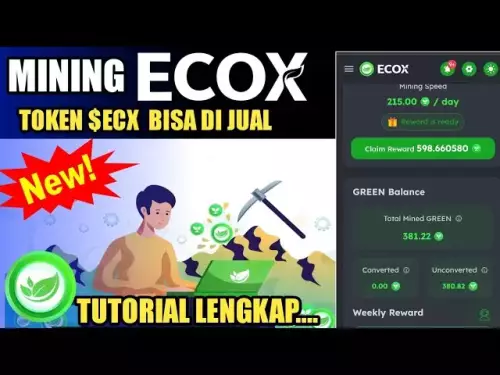 |
|
 |
|
 |
|
 |
|
 |
|
 |
|
 |
|
 |
|
 |
|
 |
|
 |
|
 |
|
 |
|
 |
|
 |
|
Cryptocurrency News Articles
YGG Play Summit Press Conference: Play, Learn, and Work Panel Discussion
Dec 27, 2024 at 02:50 pm
In a panel discussion led by Nathan Marasigan, Partner at MLaw, with YGG Co-Founder Beryl Li and Coins.ph CEO Wei Zhou, it was emphasized how web3 games are offering Filipinos learning and earning opportunities through NFTs, AI, and decentralized infrastructure.

During a panel discussion at the YGG Play Summit, moderated by Nathan Marasigan, Partner at MLaw, YGG Co-Founder Beryl Li and Coins.ph CEO Wei Zhou highlighted how web3 games are presenting Filipinos with opportunities to learn and earn through the use of NFTs, AI, and decentralized infrastructure.
The summit, which also featured a hackathon, game expo, and esports tournaments, brought together industry leaders to discuss the future of web3 gaming.
In the discussion, Li explained how YGG, which began as a guild, has now established a set of standards with various modules that enable guilds to form themselves on-chain. Guilds can pull out different modules, such as wallets or messaging functionality, to become small to medium enterprises (SMEs).
"Through these, they can even play with one another, like guild versus guild, where we’ll see more eSports and on-chain competitions. They could also pull out a questing module. Right now, YGG facilitates all these quests, but in the future, we are looking into enabling guilds to DIY quests—do-it-yourself quests. They could use that to acquire users or educate users about their products, and so on. So yeah, we’re building on-chain guilds on top of the protocol," Li added.
Marasigan then asked Zhou about the learning and earning opportunities he sees for Filipinos in the metaverse and how Coins is facilitating this.
"I’ll speak a little bit about something that’s bigger than just play-to-earn. I think there are a lot of play-to-earn opportunities, but when token prices go up or down, that changes the magnitude of your earning potential. As long as you put in the work, though, there are many cool things in the on-chain world that don’t exist offline," Zhou said.
He went on to explain how Coins has been listing international projects and noted that the exchange had only five tokens listed when it was bought two years ago. Today, it has close to 100 tokens that are traded directly against pesos.
"A lot of these projects come from Japan, Korea, the US, Europe, and other parts of the world. They want access to users here—especially gamers and those in the DePin or VIP Coins space. What we’ve done is hosted a lot of events for our users. Down the road, I hope we can do more work with YGG because you guys have a massive gaming portfolio. Hopefully, we can collaborate on a global level, not just here in the Philippines," Zhou added.
Marasigan also asked Zhou to elaborate on the term "DePin," which had been mentioned in the discussion.
"The reference point I like to use is, if you’re familiar with Axie Infinity, where NFTs are digital items that you can put into a setting to earn tokens, DePin is similar, but with physical items. For example, one of the projects we listed is called Hive Mapper, which uses a token called Honey. What they’ve done is build a mapping dash cam that you can put in your car or moped. As you drive and map roads in real-time, you earn Honey tokens based on how many kilometers you’ve mapped," Zhou explained.
He added that Hive Mapper has a token sink, where the real-time mapping data is aggregated and sold to companies like Grab or Uber, which need up-to-date maps.
"Google Maps, for example, might be updated every few years, but roads—especially in developing economies like Southeast Asia—change all the time. Hive Mapper tokens incentivize people to map roads in real-time. What we did was give out 30-40 dash cams to a group of Grab drivers, so now they’re mapping roads and earning tokens just by doing their regular work. It’s an interesting dynamic where Grab is buying the software while the drivers are mapping it. These physical infrastructure projects, like Hive Mapper, are examples of DePin. Another example would be the Solana phone, which ties into DePin and opens up new learning and earning opportunities," Zhou said.
Li also mentioned AI and how YGG is exploring ways to leverage these technologies. She highlighted the future-of-work program, which aims to upskill people as they participate in DePin projects and train AI models.
"One example is that we partnered with Sapiens Navigate to train natural language processing models. If someone has a good command of English, they can help correct sentences, which might expand into deeper applications, like training AI for medical purposes. For instance, nurses or doctors could help train medical data models in their spare time and earn rewards. These are the kinds of things we’re working on as part of YGG’s future-of-work program," Li said.
Marasigan then asked Zhou about Coins’ global expansion, which has seen the exchange transition from Coins.PH to Coins.XYZ
Disclaimer:info@kdj.com
The information provided is not trading advice. kdj.com does not assume any responsibility for any investments made based on the information provided in this article. Cryptocurrencies are highly volatile and it is highly recommended that you invest with caution after thorough research!
If you believe that the content used on this website infringes your copyright, please contact us immediately (info@kdj.com) and we will delete it promptly.























![[Pycoin] PI Coin -History update progress !! Connection with legal money .. This is crazy / Pycoin mining speed acceleration [Pycoin] PI Coin -History update progress !! Connection with legal money .. This is crazy / Pycoin mining speed acceleration](/uploads/2025/09/17/cryptocurrencies-news/videos/pycoin-pi-coin-history-update-progress-connection-legal-money-crazy-pycoin-mining-speed-acceleration/68cab0e2a7747_image_500_375.webp)






































